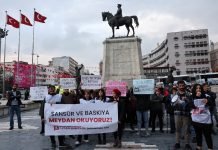Mothers and their babies as young as three months of age are being kept in quarantine cells, said inmate Emine Trabzon in a letter to Ömer Faruk Gergerlioğlu, a prominent human rights activist and lawmaker from the pro-Kurdish Peoples’ Democratic Party (HDP).
In her letter, which was published by Gergerlioğlu on Twitter, Trabzon said, “Although it’s not the babies who are arrested, arresting the mother is essentially arresting the child.”
As COVID-19 cases soar in Turkey, quarantine cells in prisons have been heavily criticized by activists and opposition politicians for being unsanitary and overcrowded. In some prisons the official quarantine period, which is two weeks, does not start until there are 30 inmates in the quarantine ward. This system has led to some inmates having to quarantine for months.
“There is a 3-month-old baby here with her mother, and when their quarantine period ends they will not be released but will be sent to a prison ward,” Trabzon said.
According to legal experts, the arrest of pregnant women or women with babies falls afoul of the Law on the Execution of Sentences and Security Measures, which stipulates that “execution of the prison sentence is delayed for women who are pregnant or have given birth within the last year and a half.” But the detention and arrest of pregnant women and mothers with babies have been continuing unabated in Turkey.
The Ankara Chief Public Prosecutor’s Office prepared a summary of proceedings against Gergerlioğlu for posting tweets about women under arrest who have infants, accusing him of inciting hatred and enmity among the public. The prosecutor’s office also requested the removal of Gergerlioğlu’s parliamentary immunity from prosecution.
Last June Yasemin Çetinkaya, who had a 10-month-old baby, was infected with COVID-19 while in in detention in the southeastern city of Diyarbakır.
Gergerlioğlu submitted a parliamentary question to Justice Minister Abdülhamit Gül about similar cases. He asked if any investigations had been launched into judges and prosecutors who have approved the arrest of pregnant women or women who have given birth within the last 18 months for violating the Law on the Execution of Sentences and Security Measures. He also inquired if they have received secret instructions to approve the arrests.
Gergerlioğlu also filed a complaint with the Board of Judges and Prosecutors (HSK) claiming that by acting against the relevant laws and the criteria set by the European Court of Human Rights regarding arrests, judges and prosecutors have abused their powers and therefore need to be criminally prosecuted.















